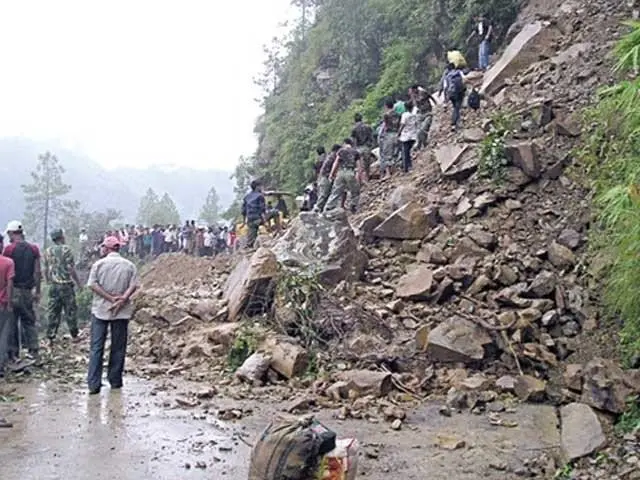Cuban officials in charge of an ongoing investigation of alleged "acoustic attacks" against US diplomats in Cuba said they found "no evidence" such incidents ever happened. They also criticized Washington for failing to provide access to the alleged victims or their medical records.
In a special program broadcast Thursday night by Cuban State TV, several Interior Ministry officials, medical experts and scientists provided information on the investigation, whose preliminary results refuted allegations that such attacks ever took place.
A team investigating US complaints of attacks on diplomats in Havana, lead by Cuban Interior Ministry's Colonel Ramiro Ramirez (R), participate in an interview in Havana, Cuba, October 22, 2017. /Reuters Photo
"We must have access to the victims, their statements, medical records and other details to conduct a further investigation that can lead the multidisciplinary team of experts that is carrying out this inquiry to a definitive conclusion," said Francisco Estrada, chief of the criminal investigations section of the Interior Ministry.
US President Donald Trump said last week he believed the Cuban government was responsible for the health problems of 24 US personnel formerly based in Cuba, including hearing loss, dizziness, fatigue and cognitive issues, which Washington said were caused by sonic attacks that took place in Cuba.
Washington withdrew in September more than half of its staff from its embassy in Havana due to security reasons and in retaliation expelled 15 Cuban diplomats working in Washington, DC.
US tourists look at products in Havana, Cuba, October 23, 2017. /Reuters Photo
Cuba denounced the expulsions as "unjustified" and accused the United States of insufficient cooperation and politicizing the issue that is still under investigation.
"US authorities made Cuba responsible for the investigation without assuming the responsibility of getting involved. They have provided neither access to the experts, nor the facts because they reported them months, weeks and days after they allegedly took place," Estrada added.
The military official said there is no "real way" to know what really happened to the victims without interviewing them.
Havana also indicated that it hasn't identified "possible authors or persons with motivation, intention or means to perform such actions."
The Cuban officials said the investigation has been carried out with "incomplete facts" and barely any cooperation from the US side.
A car with tourists drives past the US Embassy in Havana, Cuba, October 24, 2017. /Reuters Photo
Washington supplied to Cuban investigators 14 recordings of the sound it said the victims heard during the alleged attacks, but they were found to have contained nothing to damage human health.
"The recordings provided by US authorities don't cause acoustic trauma or permanent hearing losses as they are below 90 decibels. In order for a person to be affected with the symptoms the diplomats allegedly suffered they would have to constantly reach 100 decibels or more," said Carlos Barcelo, a physicist in the Cuban investigation team.
Moreover, only the victims heard the noise, which not audible to either their families living in the same houses, or their neighbors.
The experts and criminal investigation forensics team said the recordings provided by US investigators were similar to the sounds of crickets and cicadas.
The Cuban investigators also said that human exposure for prolonged periods of time to noises produced by these two types of insects can result in hearing loss, irritation and high blood pressure.
Cuban Interior Ministry's Colonel Ramiro Ramirez, who leads a team investigating US complaints of
alleged sonic attacks on diplomats in Havana, speaks during an interview in Havana, Cuba, October 22, 2017. /Reuters Photo
"The medical investigations we have carried out used only incomplete facts. We haven't received scientific evidence or information to reach a conclusion in any sense," said Manuel Villar, head of the medical investigating team.
Cuba has also conducted medical tests and interviewed more than 300 people in the different neighborhoods where the alleged attacks took place, and all the results came out negative.
"We did audiometric tests to the neighbors of the alleged victims and none came out positive for an acoustic trauma, nor the symptoms the diplomats reported," said audiologist Alida Suarez of the medical investigating team.
Between February and June, the US embassy in Havana requested from Cuban authorities a total of 158 visas for the family and friends of diplomats accredited in the island, a move that seems to contradict Washington' s claims that US personnel were affected by the alleged attacked.
"When the incidents were first reported the chief of diplomatic security met with the US embassy head security official to cooperate in the investigation. This diplomat whose main responsibility is to ensure the security of US personnel in the country knew nothing about these incidents. Later on this same official was reported as one of the alleged victims," said Estrada.
In late September, Washington issued a travel warning asking Americans not to visit the country because some attacks occurred in hotels, and stopped granting new visas to Cuban travelers.
US Secretary of State Rex Tillerson said Washington would maintain diplomatic ties with Cuba and the two countries would continue to cooperate in investigating the alleged attacks.
(ASIA PACIFIC DAILY)
 简体中文
简体中文

